92% of businesses expect inflation to impact their operations—here’s how they plan to fight back.
In 2023, some Wall Street experts claim America might be able to circumvent a recession and others say avoiding a downturn is nothing but a fairy tale. In this economic uncertainty, having an annual financial plan for your business can help you feel confident, regardless of what happens.
In fact, Capterra’s 2023 Financial Planning Survey of 270 business leaders found that 90% of organizations have already outlined a financial plan, which they use to combat inflation, inform software adoption, and more*.
Examining how other small and midsize businesses (SMBs) in 2023 approach the process and how they navigate the finer details— like where to store their cash reserves or how they plan to handle upcoming tax policies—can help your business adjust its financial strategy to prepare for uncertainty.
/ Key findings
Nearly all (90%) businesses already have a financial plan in place—and to deal with challenges, they work with certified financial planners (42%) or internal or external accountants (36%).
A majority (87%) of businesses project increased profits in the next year but worry about how inflation will affect their operations (92%).
In preparation for stormy economic forecasts, 89% of businesses have enough savings to cover at least six months of slow sales and 84% have a large cushion built into their financial plan for unanticipated costs or investments, which they keep in interest-bearing deposit accounts.
Businesses see technology as a valuable asset in the financial planning process and 78% plan to adopt new technology such as cash flow management, budgeting and forecasting, and financial analysis software.
What is a financial plan and why does it matter?
A financial plan outlines a business’s current financial state and establishes a strategy to meet short- and long-term goals for growth. This overall picture of a business’s financial health serves as a way for business owners to measure their progress and affords them the ability to make adjustments along the way. As a resource, a financial plan can help businesses manage cash flow, make better use of tax dollars, and secure financing from lenders or investors.
Businesses partner with experts to make the planning process simple
On paper, the financial planning process can seem simple. In practice, the activity can quickly become complex. A lot of time, collaboration, and data is involved. Only 8% of businesses surveyed did not work with a certified financial planner (CFP) or a certified public accountant (CPA) to construct a plan for 2023.
In all, the majority of respondents prefer working with a CFP (42%) to tackle financial planning, rather than partnering with an internal (21%) or external (15%) CPA. These professionals’ expertise can make the process, which many business owners find daunting, much more manageable.
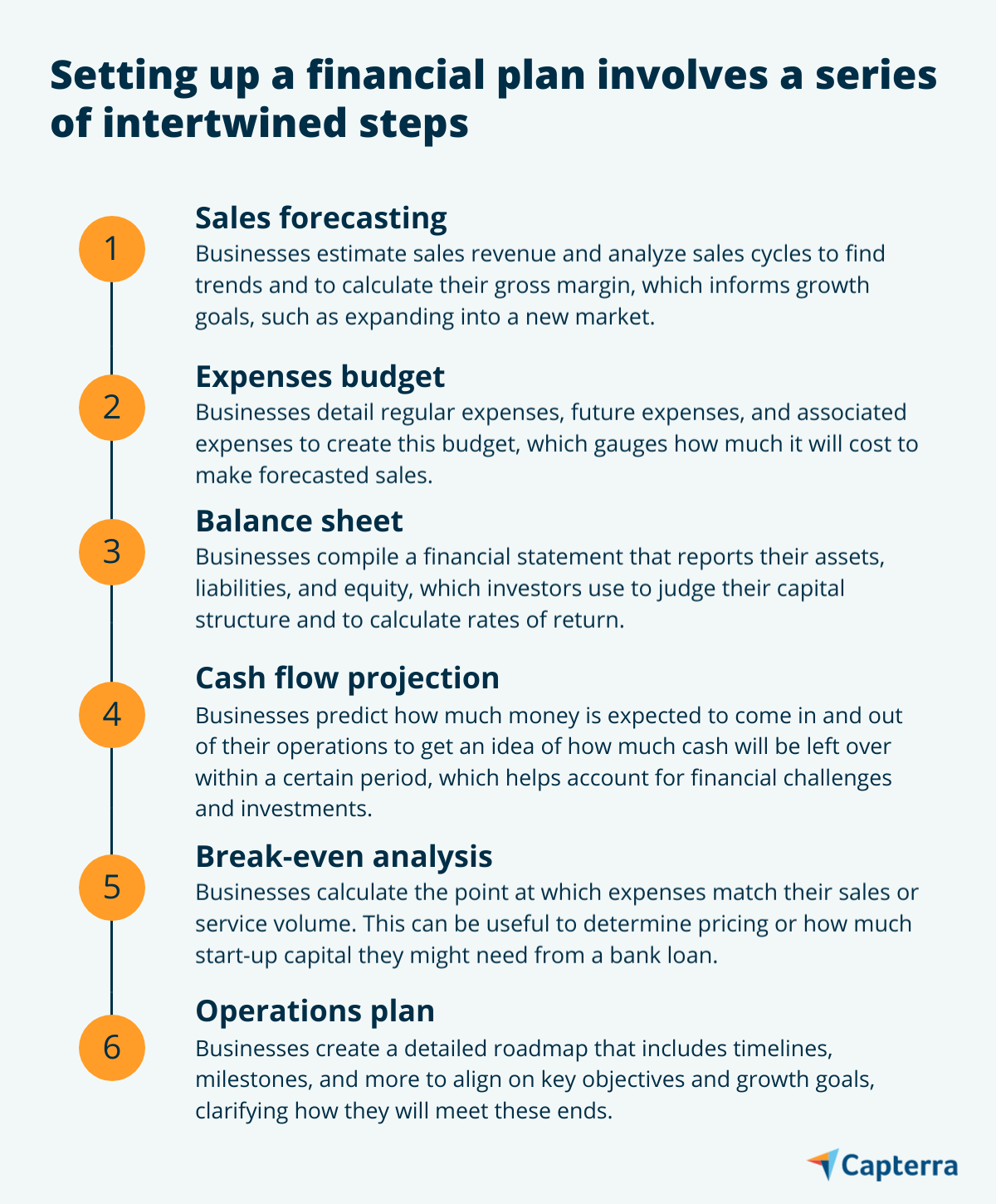
Many organizational challenges that business leaders say they face—such as a lack of internal communication (37%) and disconnected departments (26%)—can be addressed by a CFP. They can help create operations plans and overarching goals that can unite internal teams. These plans also account for unexpected events (a challenge reported by 37% of respondents) by including built-in cash cushions and savings reserves that serve as safety nets.
Both professionals can assist businesses with operational challenges, such as handling various manual tasks (28% report as a challenge) that go into compiling a balance sheet. Creating cash flow projections and other financial statements can help reliably measure results, which was another respondent concern.
CPAs lend themselves well to ensuring businesses are aware of regulatory changes and important economic policies, such as The Inflation Reduction Act. Not only can they aid organizations in identifying and applying for yearly tax credits and deductions, they can perform an official audit to find places to cut spending, as inflation itself is one of the most pressing issues businesses say they face in 2023.
/ The takeaway
If you’re starting a financial plan from scratch or are struggling with poor cash flow, you might want to partner with a CFP to outline and optimize your strategy. If you’re focused on tax strategy or attaining tax credits, working with a CPA is likely the better option. Interested in learning more about hiring a CFP or CPA? Check out our hiring guide for accounting services.
Inflation and other trends threaten to eat into positive revenue forecast
Since 2022, America has been plagued by high inflation. While experts are conflicted as to what holistically caused inflation’s meteoric rise, many agree on certain contributing factors, such as the pandemic crippling supply chains, governmental relief efforts ballooning the money supply, an increase in demand for goods that supply couldn't handle, and economic consequences related to the invasion of Ukraine[1].
In 2023, 92% of business owners worry about inflation and say it will have some impact on their business throughout the year.
Businesses report that rising costs of raw materials and changing consumer purchasing trends will heavily impact their profits. For example, shoppers today have a strong preference for eco-friendly products and businesses, and many are turning to digital payments to finance such goods and services[2].
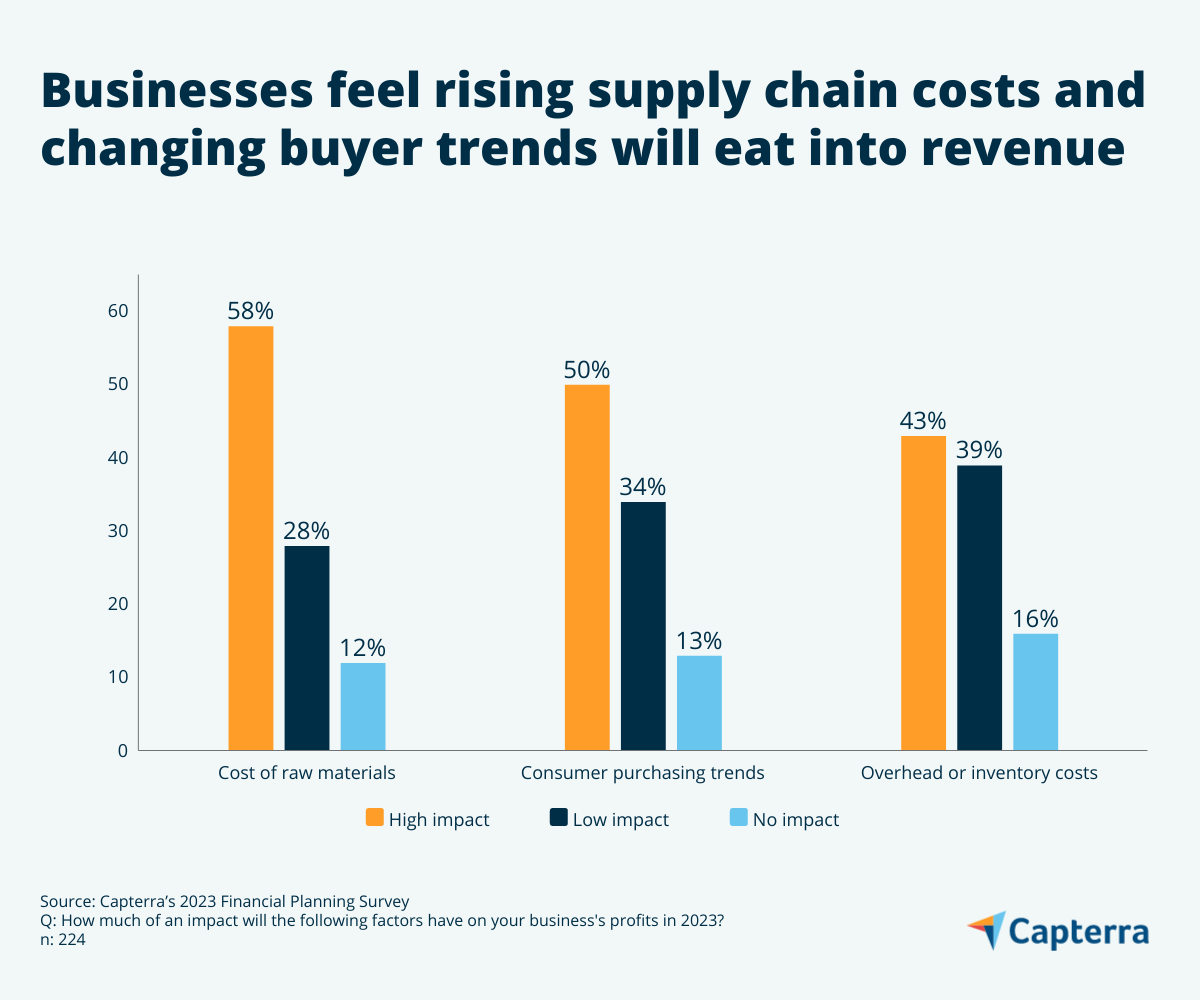
Unfortunately, there will never be a silver bullet to help businesses deal with inflation hiking prices or a crystal ball to foresee consumer preferences. However, this outlook is colored by optimism—despite recession forecasts, 87% of businesses expect their overall revenue to increase compared to 2022.
/ The takeaway
Fortunately, having a comprehensive financial plan in place can allow businesses to proactively respond to forecasted hurdles. For instance, if a construction company is worried about the price of lumber increasing in the next six months, they can refer to their expense budget to calculate an estimate of what the raw material might cost due to impending inflation. If these prices will run them into the red, they could make the choice to enter into a future contract with their supplier to save money in the long-term.
Tax planning has become more crucial than ever as businesses lean into tax breaks
A large part of financial planning is tax planning, and this isn’t lost on businesses—93% say they have a clear understanding of how new tax policies might impact their operations in 2023. One of the most impactful pieces of legislation that will roll out in the new year is The Inflation Reduction Act of 2022 (IRA), which was signed into law in August 2022[3].
Some aspects of the IRA are focused on lowering costs for SMBs by keeping health care prices low, supporting energy-saving investments, and fortifying supply chain resilience through a myriad of tax credits and reductions. For example, the Research and Development tax credit has been doubled from $250,000 to $500,000, allowing businesses to offset payroll tax and potentially free up significant resources.
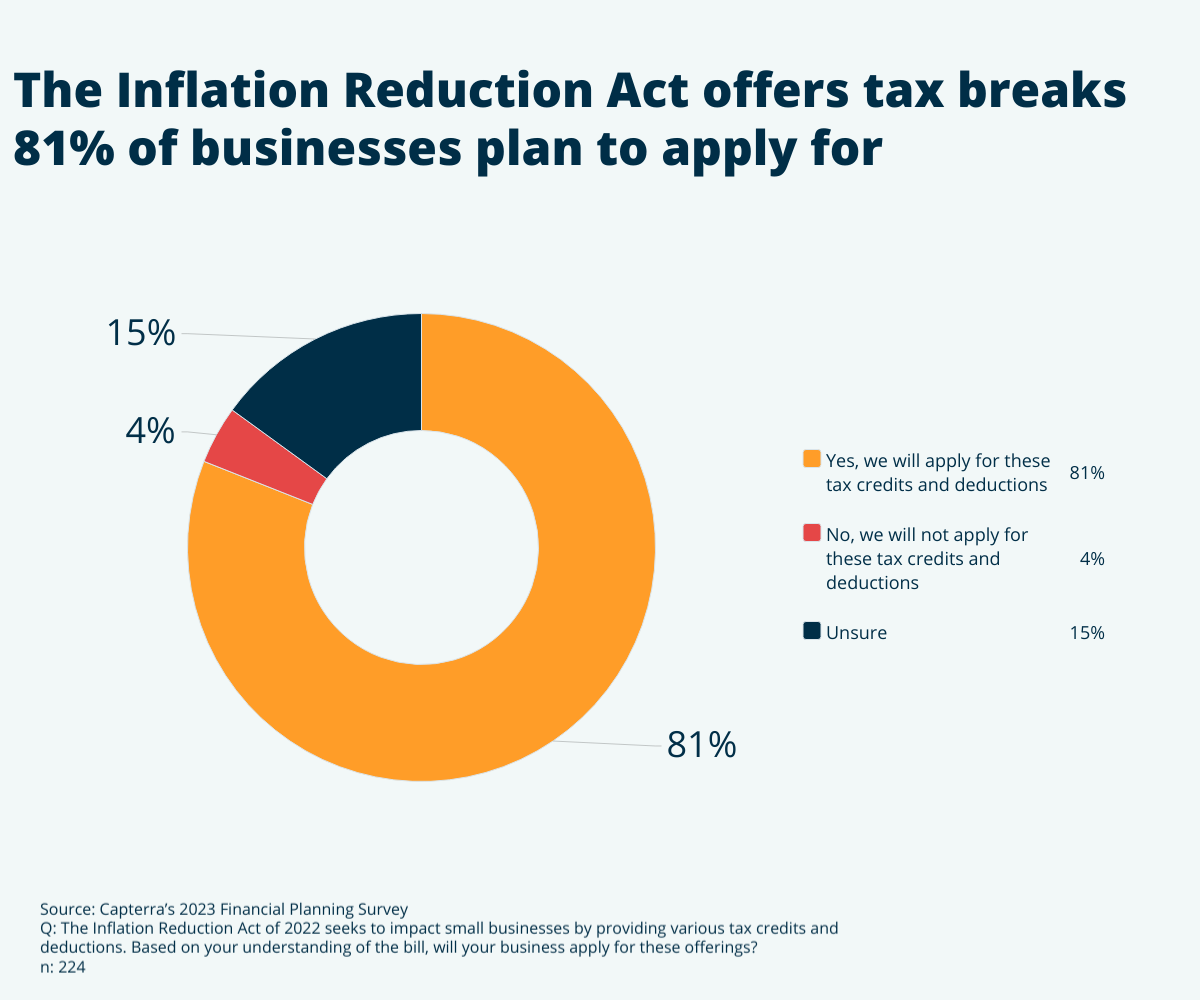
In light of these new tax breaks, 81% of organizations plan to apply for credits and deductions. Many of these provisions are eco-friendly and aim to combat climate change, which businesses should take advantage of. Harnessing clean energy credits provides a potential of up to ~70% in tax savings and highlights a dedication to sustainability that is immensely attractive to consumers in 2023[4].
/ The takeaway
From the federal to the state level, there’s a dizzying amount of credits and deductions businesses can apply for, and all come with a list of restrictions and exclusions. Working with a CFP or a CPA can make the process of identifying relevant tax breaks much more simple for businesses and those tax breaks can free up budget in their overall financial plan.
High interest rates are a silver lining for businesses savvy on where to save
Any financial plan worth its salt has a built-in emergency fund—an essential resource that affords businesses the ability to be more strategic with their income, weather financial storms, and grow with confidence.
In light of current economic conditions, more than three-fourths of businesses (84%) say that they’ve built in a large cushion in case of unanticipated costs or investments and a similar majority (89%) have nestled away enough savings in case of six months of slow sales.
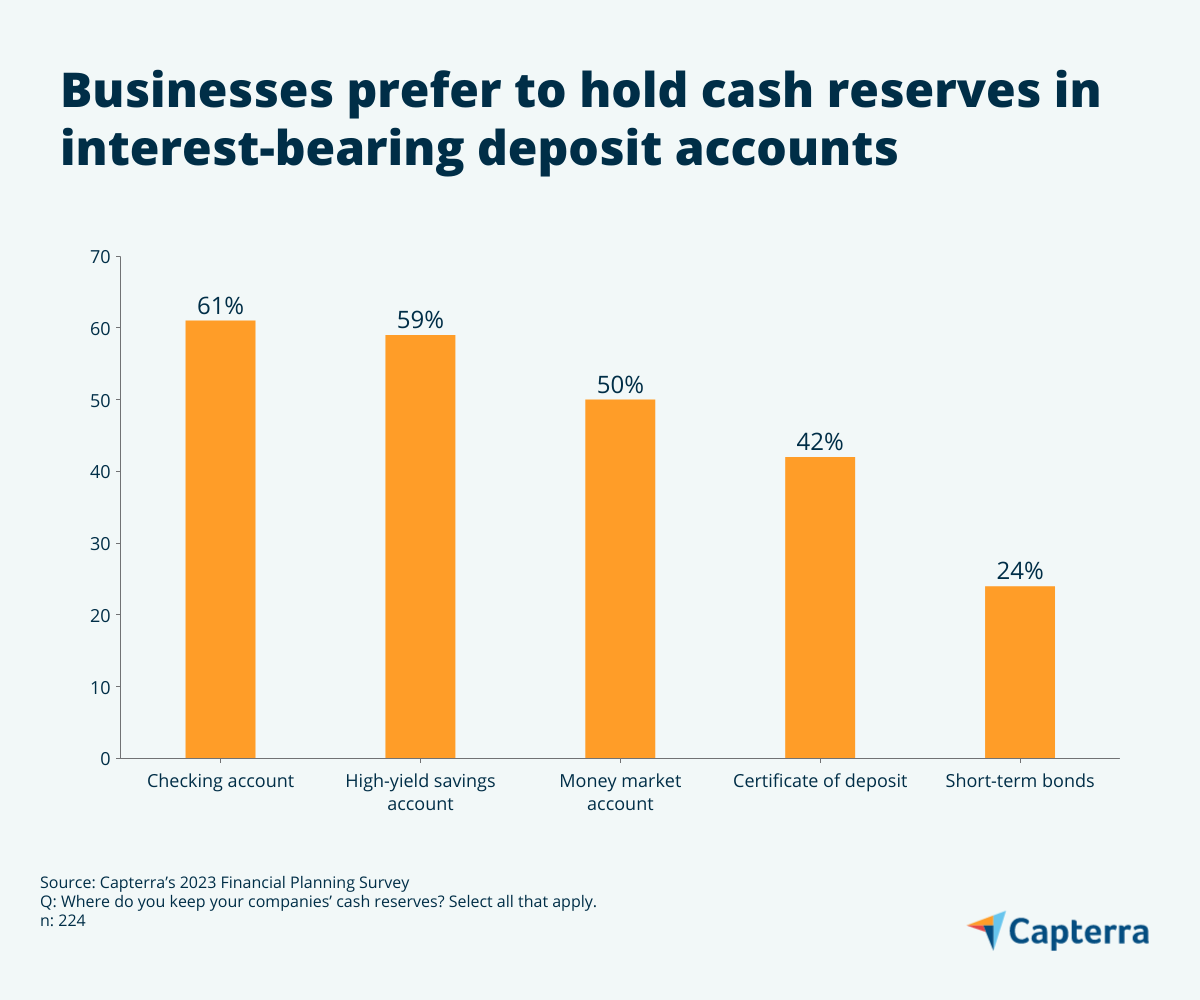
Although most respondents report keeping their cash reserves in a checking account, many others prefer using high-yield savings or money market accounts. If there’s a silver lining for businesses dealing with high inflation, it’s that the Federal Reserve’s go-to practice of raising interest rates to combat inflation can yield high returns for tactful savers, as they show no signs of reducing rates anytime soon[5].
While checking accounts are easily accessible and can sometimes earn rewards, they typically don’t provide the same level of long-term value that interest-bearing deposit accounts do. For example, both a money market and a high-yield savings account offer higher APY than traditional checking and saving accounts, which can help businesses keep the value of their savings during inflation.
However, not all interest-bearing accounts are equal and deciding where to place cash reserves often depends on the level of liquidity a business needs. While high-yield savings accounts tend to charge zero fees for maintaining a low account balance, they might not let organizations write checks or use a debit card to access funds and sometimes need to be linked to a checking account, unlike a money market account.
/ The takeaway
Businesses should aim to house around three to six months of expenses in cash reserves. If you’re having trouble establishing a reserve, consider opening up a line of credit to act as a backstop in case of emergencies until you’re set up. If you have more than you need nestled away, consider eliminating any high-interest debt or explore things like investing in equipment or other capital improvements.
Software aids in financial planning
Within the next year, 78% of businesses say that they plan on adopting new finance or accounting software, and only 23% say they have earmarked less than $10,000 toward tech adoption.
Much of the technology respondents find attractive helps streamline parts of the financial planning process. Budgeting and forecasting software (43%) makes it easier for teams to coordinate by providing a place to collaborate via one single tool, and financial analysis software (37%) can crunch historic data and churn out financial records to prepare for what-if scenarios like a deep recession or extreme periods of inflation.
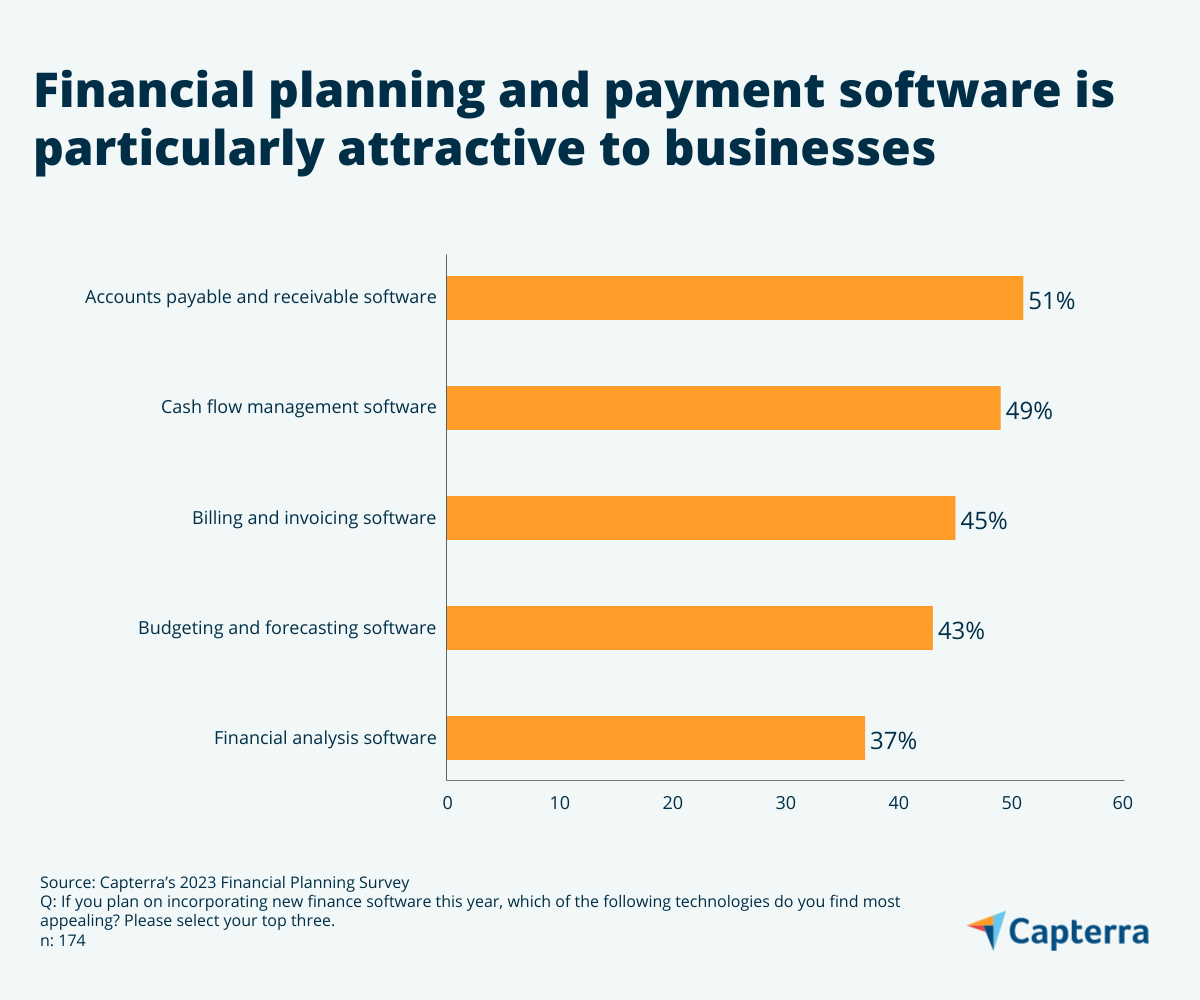
Specifically, technology that eases creating an expense budget or an accurate balance sheet—such as accounts payable and receivable (51%) and billing and invoicing (45%) software—or handles the technical tasks of cash flow management (49%) caught the eye of respondents.
/ The takeaway
Adopting financial software can free up time for your accounting team by handling the preparation of financial statements and by automating data and cash flow collection. While you can explore piecemeal solutions, a variety of general accounting software bundles in budgeting and forecasting capabilities, billing and invoicing management, and other features that can streamline the financial planning process considerably.
The future might be uncertain but preparation doesn't have to be
Every fiscal year should kick off with the construction of a financial plan, and you have numerous ways to tackle the process.You can work with an expert like a CFA or CPA, leverage accounting software to deal with complex parts of the process, or harness the strengths of both.
Whatever path is right for you, here are some high-level tips to keep in mind so that you can move forward into 2023 with confidence.
Leverage all available resources:The Service Corps of Retired Executives (SCORE) provides free resources, ranging from financial statement templates all the way up to mentorship, for businesses to take advantage of[6].
Start small: Curating an emergency fund is extremely important for any businesses, and while most advisors say you should already have three to six months’ worth of savings on hand, don’t sweat it if you aren’t there yet. Consistency is key—start small and put away as much as you can whenever fiscally responsible.
Finance a fiduciary: When looking for a financial advisor, you need to ensure they are an accredited fiduciary that is legally obligated to act in your best interest. Financial advisors without these legal qualifications may put their interest above yours and end up wasting your money and time. CFP and CPAs are legal fiduciaries, but you should always verify with your advisor and check with your state bureau or the Securities and Exchange Commission to confirm their registration.
To send you off with even more resources to prepare you for the future, check out the top trends that will define finance in the coming year as you review your financial plan, and don’t hesitate to read into how to identify key benchmarks so that you’re making sure your budget and strategy aligns with your organization’s goals for 2023.

